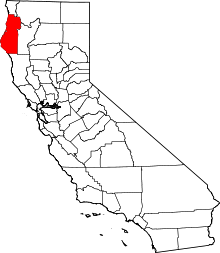California county's corporate anti-electioneering measure abandoned
Tuesday, November 11, 2008
Yesterday, a settlement agreement was filed in court that effectively brings to an end a two-year-old law banning many election-related activities by corporations in a north-western county of California.
The County of Humboldt and Pacific Legal Defense Foundation agreed to a settlement declaring a law banning corporate political contributions, Measure T, null and void. If approved by a US District Court judge, this will end the lawsuit against the County that stems from allegations that the law, if enforced, is a violation of the 1st and 14th Amendments of the US Constitution.

Image: David Benbennick.
In California, the voters have the ability to propose laws at general elections subject to certain restrictions. In 2006, a group called Democracy Unlimited (DU) sponsored a ban on political contributions from non local corporations. DU was able to acquire the signatures necessary to qualify the measure and it was listed on the ballot as Measure T.
Despite it qualifying for the ballot, many individuals campaigned against it. They argued that it was unconstitutional. Opponents pointed out that in order for a corporation to be considered local, everything about it must be based in Humboldt County. However, unions, which tend to be corporations, only needed one member in the County. Opponents drew upon the 1st and 14th Amendments to support their contentions, arguing that since corporations have been held as persons, the measure infringes on free speech, and that since the measure gives preference to some corporations and not others, it violates the Equal Rights provisions of the 14th Amendment.
Notwithstanding these arguments, the measure was passed easily at the polls. Earlier this year, the Pacific Legal Foundation sued the County on the behalf of Mercer-Fraser and O&M, two companies that did business locally, but did not meet the local corporation standard. The lawsuit sought a preliminary injunction against enforcement on the grounds that it was most likely unconstitutional. Judge Susan Illston granted the motion for an injunction in September, agreeing with the plaintiffs that the measure as written was most likely a violation of the 1st and 14th Amendments. According to county officials, this settlement was prompted by an assessment of the merits of continuing litigation and the costs that such litigation would entail. The settlement would declare Measure T null and void and unconstitutional. Additionally, the County would be required to pay $44,000 in legal fees to Pacific Legal Foundation.
Supporters of Measure T expressed disappointment accusing the county of caving to corporate pressure and not utilizing available resources. County officials have stated that the only reason why they fought the suit was because the measure was a voter initiative, that the costs of litigation would be high, and the end result would most likely remain the same.
Sources
- "Measure T: 'Null and void'" — Times Standard, November 11, 2008
- "Settlement agreement and [proposed] stipulated judgement" — U.S. District Court , Northern District of California, Retrieved November 11, 2008
- "Humboldt County Ordinance to Protect Our Right to Fair Elections and Local Democracy" — Humboldt Coalition for Community Rights, Retrieved November 11, 2008
- "Humboldt county board of supervisors cave to corporate pressure: agreement to settle over measure T filed in federal court" — Humboldt Coalition for Community Rights, November 10, 2008
- "Federal court issues injunction against measure T" — Humboldt Coalition for Community Rights, September 23, 2006

